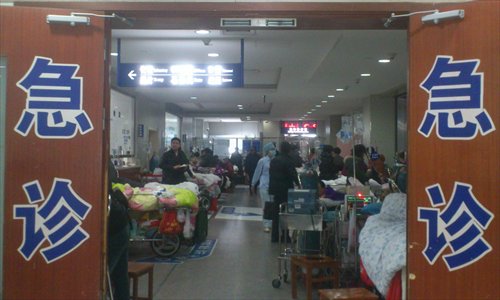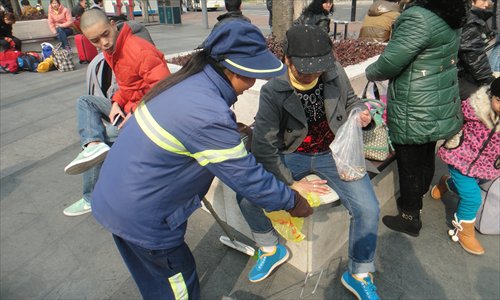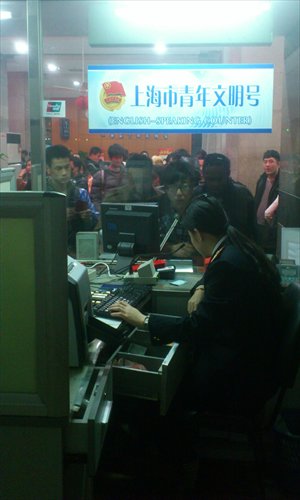Healthy, clean and hardworking

While most people celebrated the Spring Festival by journeying to their homes or dining with families, some had to remain hard at work. The Global Times visited three groups who in different ways, helped keep the city alive and thriving over the period when most of us enjoyed time off.
The emergency department at Zhongshan Hospital is the largest hospital emergency department in East China, treating more than 1,300 patients every day. Thirty-one doctors and 140 nurses work there and they all work shifts over the Spring Festival - with the outpatients departments closed, the emergency staff have to cover for any patients seeking treatment that is not strictly an emergency.
When the Global Times visited the department, the doctor in charge of the daily shift, Zhang Yaping, said, "If there is a need we can always find a bed in a ward. As well as the 150 people in the transfusion room here there are a great many more patients than usual. Early shift doctors start at 7:30 am and they don't get to have a drink of water until 11 am and probably won't have a toilet break for an hour after that."
Positive emotions
Sun Zhan is the vice director of the medical and emergency departments at Zhongshan Hospital. He began working at Zhongshan after graduating from the Shanghai Medical College of Fudan University in 1993 and for the following 20 years he has missed every family reunion dinner at home in Xi'an, Shaanxi Province. "We have to learn to transfer our feelings into positive emotions for our work and the patients."
While the concept of "reverse family reunions" is a recent trend - where parents go to visit the children - for Sun his parents began doing this 20 years ago. Often this was the only way they would get to see their son in this period.
The atmosphere in the department over the Spring Festival is markedly different. "Usually, night-shift doctors go out to buy something to eat to stay fresh but during the festival, the streets are empty - there is nothing on the streets at all. It's a sudden reminder that the rest of the world is on holiday while we are still here working," Sun said.
Almost all of the doctors on duty agree with Sun. Gu Guorong, an associate chief physician told the Global Times that he lives in Meilong town in Minhang district and when he caught the bus to go to work on New Year's Day morning there was only himself and the driver on the bus. "It's as if this is my personal bus!"
Song Zhenju, another associate physician, said that on festival days he used to visit his old teachers and family members. But working in the emergency department has meant he is too involved there and hasn't the time to visit them or even call them, so sometimes they called him at work and wished him Happy New Year, which makes him feel slightly guilty.
"People and the media often praise us for working over the holidays but it's not that good for us personally," Sun said. Family life suffers with the unrelenting schedules.
"Behind every hardworking emergency department doctor, there is a family that supports him. The family looks after the trivial day-to-day domestic chores for them to ensure they can focus on their work," Zhang said. He is the father of an 8-year-old boy but he can't enjoy the holidays with his son like an ordinary father. Instead of looking after his child he looks after his patients.
Although these drawbacks would encourage many people to change jobs over the past 10 years none of the emergency department doctors have quit. "Ultimately, we love the job, we love the medical team here and the feeling when we save someone's life is incomparable," Sun said, and other doctors at the department echoed.
During holidays emergency departments tend to see more serious and critical cases than usual. Sun recalled at one time having to rush to treat a patient who had had his arm blown off by fireworks.
And assaults on medical staff are not uncommon. Especially at this time of year when patients or their family members may have drunk a lot of alcohol. "They can lose their tempers very easily."

Keeping it clean
At 6 am on New Year's morning, Shanghai was still dark. Most people were sound asleep but the women street cleaners based at Shanghai South Railway Station were already hard at work.
The station is a major transport hub serving trains, metros and long-distance and city buses and daily more than 100,000 passengers arrive or depart from there. But over the Spring Festival period more than double the usual number of passengers converge there.
"We have 90 women in this team and we are responsible for the 77,000 square meters of streets around the Shanghai South Railway Station, the 89,400 square meters of gardens and lawns, the 1,235 windows and glass doors, 202 seats, and 120 garbage cans," explained Li Guihong, the team leader.
Li said the team usually works two shifts - from 6 am to 2 pm and a night shift from 2 pm to 10 pm. Each cleaner has a specific area and tasks. They do not get a holiday at this key time because, as Li said, "the city has to be cleaned every day."
Over the Spring Festival period the cleaners have to work a lot harder than normal and one of their bugbears is having to clean up the chewing gum and melon seeds that many of the New Year travellers snack on. Li and her colleagues carry plastic bags with them and hand these out to any passenger they see chewing gum or seeds so that they have a receptacle.
Another extra task at this time of year is cleaning up after fireworks. "Perhaps because of the government's campaign there were fewer fireworks this year but we still filled five large garbage bins with firework paper - last year we filled 10," Li said.
Yang Shengfen from Chongqing worked the early shift on New Year's Day. She hasn't made it home for a Spring Festival since she joined the team seven years ago. When she called her three children in Chongqing, they asked when she would return and told her they missed her. She said she feels sad at this but she has to work in the city to support her family - her husband died and she is now the sole earner.
Many of these cleaners come from other provinces but their jobs mean that they cannot return home for the festival. Fourteen of the team are Shanghai women but their jobs still stop them from spending as much time with their families as they would like. Xia Meng is a 31-year-old Shanghainese whose husband died years ago. She feels constantly guilty because even though her child has lost her father her mother still cannot spend a lot of time with her. It's hard for her to tell her daughter that she has to go to work at the Spring Festival when everyone else is on holiday.
An average worker's monthly salary in Shanghai is 4,692 yuan ($773), the highest in China. These cleaners earn around 3,000 yuan a month and although this is higher than past years it is still below the average and makes it hard for the women to pay rent and look after their families.
Li said that as the festival came to an end there was a huge increase in the number of passengers arriving back in the city. The trains arriving at Shanghai South also brought 70 to 80 tons of garbage every day - normally the cleaners collect just 3 to 4 tons.

Happy journeys
It's not just the trains that travel at higher speeds these days - ticket sales have also become streamlined with the website www.12306.cn giving people rapid access to rail tickets. But the people manning the ticket windows at Shanghai Railway Station are still busy and even more so during the Spring Festival period.
Wang Huaicai is a senior ticket seller who first worked at ticket agencies before he joined the Shanghai Railway Station in 1998 and stopped having the New Year holiday. "Every year, the Spring Festival period is the busiest time for us. Millions of people depart from Shanghai and this puts a huge pressure on us and the ticketing system." Wang said that even today many migrant workers do not use the online ticketing system but come to the station to buy their tickets personally.
To handle the extra demand the ticket office of the Shanghai Railway Station South Square set aside a six-person team led by Wang to cover the late night sales. Wang said that even if one of the team feels sick they don't ask for time off because there is no one to cover for them at this period.
The railways are run along military lines with a strict disciplinary code, and some new employees find it hard to accept that they have to work harder and throughout the holiday period. Wang explains to them that this is the nature of their jobs and to continue working there they have to accept the rules. Wang himself was sick and had a high temperature over the holiday period but returned to work after being treated at a hospital.
The six night-shift ticket windows at the station handle different ticket options. There is a window where the seller speaks English and can deal with foreigners, and another window where tickets can be exchanged or refunded. One window sells tickets to Hong Kong.
Because of the demand tickets are sold out days in advance and people often lose their temper when they are told they cannot travel when they want to. The sellers understand the pressure and always try to find an alternative day or route or advise customers to try a long-distance bus trip.
And they cannot afford to make mistakes with the money. If their tills are short the sellers themselves have to make up the shortfall - some ticket sellers have been known to have to pay out 3,000 yuan over a month, a large proportion of their salaries. Over the high-pressure festival period the likelihood of mistakes soars.